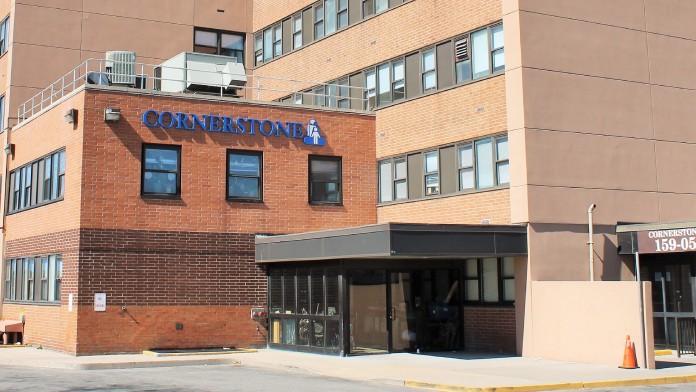Cornerstone of Medical Arts Center

About Cornerstone of Medical Arts Center
Cornerstone Treatment Facilities Network has been helping New Yorkers overcome substance use challenges for over 40 years. They operate two facilities, including the newly renovated five-story Cornerstone of Medical Arts Center (CMAC) on Union Turnpike in Queens.
The facility includes 176 beds, with 116 designated for inpatient detox programs and 60 for inpatient rehab. At CMAC, clients can receive a full continuum of care that includes medically supervised detox and residential rehab. The facility accepts Medicaid for payment of services.
Medically Supervised Withdrawal Services
After a seamless intake process, which includes a thorough assessment and personalized care planning, you can begin your healing journey with medical detox. This short-term process supports your body in flushing out toxins, setting a solid foundation for the next phase of your recovery. You’ll be monitored 24/7 by a team of interdisciplinary experts to ensure your safety throughout the process.
These professionals may administer methadone or Suboxone when clinically necessary to help manage withdrawal symptoms and ensure your comfort. Once medically stable, you’ll transition to the inpatient rehab unit for continued support and treatment.
Structured and Continued Care For Long-Term Success
During inpatient rehab, you’ll receive 24/7 intensive therapeutic support to help you build practical skills for maintaining a clean and sober lifestyle. A thorough bio-psycho-social evaluation ensures recovery is tailored to your unique needs to achieve the best possible outcomes. Sessions combine lectures with educational films to deepen your understanding of addiction and keep you engaged throughout your recovery journey.
Beyond therapy, you’ll engage in educational seminars, recreational activities like yoga & Zumba as well as nutritional programming. This strengthens your body, mind and sense of purpose as you work toward long-term recovery. You may continue to receive methadone and Suboxone prescriptions via medication-assisted treatment to reduce relapse risk and curb cravings.
The program also incorporates 12-step principles, including participation in AA or NA, to help you build meaningful connections and a strong support network. Medical care is provided as needed to address any physical health concerns that could affect your recovery progress.
| Levels of Care | Detox Service Setting | Programs | Payment Options |
|---|---|---|---|
|
Inpatient and residential programs provide round-the-clock medical and emotional support as you live at the treatment facility. This level of care may be recommended if you have severe addictions or mental health conditions since it removes outside distractions and allows you to focus solely on therapy. |
In outpatient therapy, you’ll attend therapy sessions several times each week while living at home. This is ideal if you have a strong support system and a lower risk of relapse. Outpatient treatment offers flexibility to maintain work, school or family obligations. |
||
|
Inpatient detox occurs in a dedicated treatment facility. You’ll live there around the clock and receive intensive medical support and supervision to help manage your withdrawal symptoms. It is suitable for individuals with moderate to severe addictions as it ensures a stable detox environment. |
Outpatient detox gives you access to medically supervised withdrawal services while still allowing you to live at home. You’ll attend a clinic for treatment and monitoring. This flexible option is suitable for those with mild to moderate withdrawal symptoms who have strong support systems. |
||
|
Alcohol detox programs offer medical support to help individuals withdraw safely from alcohol. Your care team may use medications to ease your symptoms and provide medical monitoring to address complications. |
Drug detox programs support individuals who are withdrawing from addictive substances like cocaine and heroin. Medical support helps you manage symptoms in a controlled and safe environment so you can achieve initial sobriety. |
||
|
Private Insurance
|
Self Pay
|
Levels of Care
Inpatient and residential programs provide round-the-clock medical and emotional support as you live at the treatment facility. This level of care may be recommended if you have severe addictions or mental health conditions since it removes outside distractions and allows you to focus solely on therapy.
In outpatient therapy, you’ll attend therapy sessions several times each week while living at home. This is ideal if you have a strong support system and a lower risk of relapse. Outpatient treatment offers flexibility to maintain work, school or family obligations.
Detox Service Setting
Inpatient detox occurs in a dedicated treatment facility. You’ll live there around the clock and receive intensive medical support and supervision to help manage your withdrawal symptoms. It is suitable for individuals with moderate to severe addictions as it ensures a stable detox environment.
Outpatient detox gives you access to medically supervised withdrawal services while still allowing you to live at home. You’ll attend a clinic for treatment and monitoring. This flexible option is suitable for those with mild to moderate withdrawal symptoms who have strong support systems.
Programs
Alcohol detox programs offer medical support to help individuals withdraw safely from alcohol. Your care team may use medications to ease your symptoms and provide medical monitoring to address complications.
Drug detox programs support individuals who are withdrawing from addictive substances like cocaine and heroin. Medical support helps you manage symptoms in a controlled and safe environment so you can achieve initial sobriety.
Contact

Chika Uchendu is a multi-niche and seasoned SEO writer with expertise in personal finance, technology and health. He’s had over 10 years of experience creating impactful content that resonates with diverse audiences. His journalism and digital marketing background enables him to combine data-driven analysis with engaging storytelling. This helps drive engagement and grants target audiences access to valuable information.
Chika has worked for Benzinga, Motley Fool, Webopedia and many other popular online media outlets on a freelance and contractual basis. He is using his voice to drive awareness and meaningful change among people dealing with the pandemic of substance use disorder. Chika is an ambivert who enjoys sports, hiking, reading and video gaming.

Eric has a passion for content creation, whether it’s writing articles or making YouTube videos. He appreciates the power of storytelling to inform an audience about the information they need to know. In addition to writing, he also spends his time traveling and discovering new restaurants to enjoy a meal.




